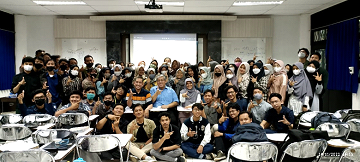
Department of Physics of IPB University Invites Particle Physics Researchers to Share Knowledge
Department of Physics of IPB University Invites Particle Physics Researchers to Share Knowledge
The Department of Physics of IPB University again invites practitioners to share knowledge and experiences with students at the Dramaga IPB campus, Bogor. On this occasion, Experimental Particle Physics expert, Dr. Suharyo Sumowidagdo was invited to give a guest lecture in the Nuclear and Particle Physics Course, 14-15/11.
Dr. Suharyo Sumowidagdo is a researcher at the National Research and Innovation Agency (BRIN) who has won various prestigious awards. Some of them are the Habibie Award in 2020 and the Achmad Bakrie Award in 2015 for his brilliant achievements as a world-class Particle Physics Researcher.
In his presentation, he explained about the elementary particle detector at the European Council for Nuclear Research (CERN) and the Large Hadron Collider (LHC) particle accelerator which proved the existence of the Higgs particle and efforts to search for dark matter particle candidates. He explained, particle detection is a very challenging and not easy thing because the design of the detector is greatly influenced by the type and energy of the particles to be detected.
According to him, to build a detector at CERN, expertise from various disciplines is needed, from physicists, electronics engineers, computer scientists, statisticians and mathematicians, and others. Detector designs for low-energy particles such as X-ray and gamma-ray have a different design from hadronic and leptonic particle detectors.
Suharyo explained, various types of detectors such as calorimeters, semiconductor crystal detectors, scintillators, photomultipliers, and others need to be designed for their placement and synchronization arrangements. This is necessary to track] a wide variety of particles resulting from proton-proton scattering at a high energy of about 13.6 TeV (Tera electron Volts).
Suharyo also explained various modes of particle detection based on elementary reactions that might occur. He also explained the branching ratio of each elementary reaction along with examples of calculations.
At the end of the lecture, he motivated students to always dream and try to be able to compete, achieve, and take part on an international scale. He was very pleased to be given the opportunity to be able to share knowledge and experience with Physics students of IPB University. “I am very grateful to have the opportunity to learn directly from a CERN researcher from Indonesia,” he said.
Prof. Tony Sumaryada, as the tutor for the Nuclear and Particle Physics course, revealed that, “It is a pleasure for us to be able to invite world-class researchers to share knowledge regarding state-of-the-art research in the field of particle physics, as well as motivate students to be able to excel and take part as world-class researchers in the future.” (*) (IAAS/MLD)
This news was originally published in IPB Today


